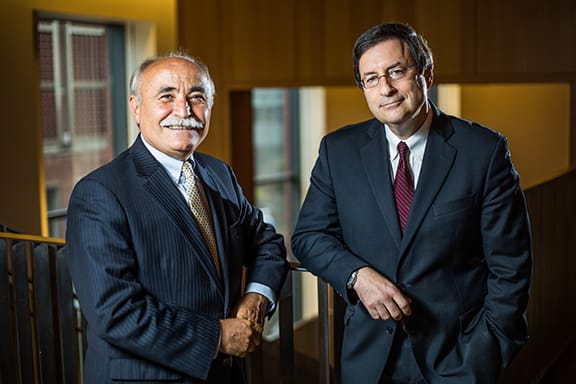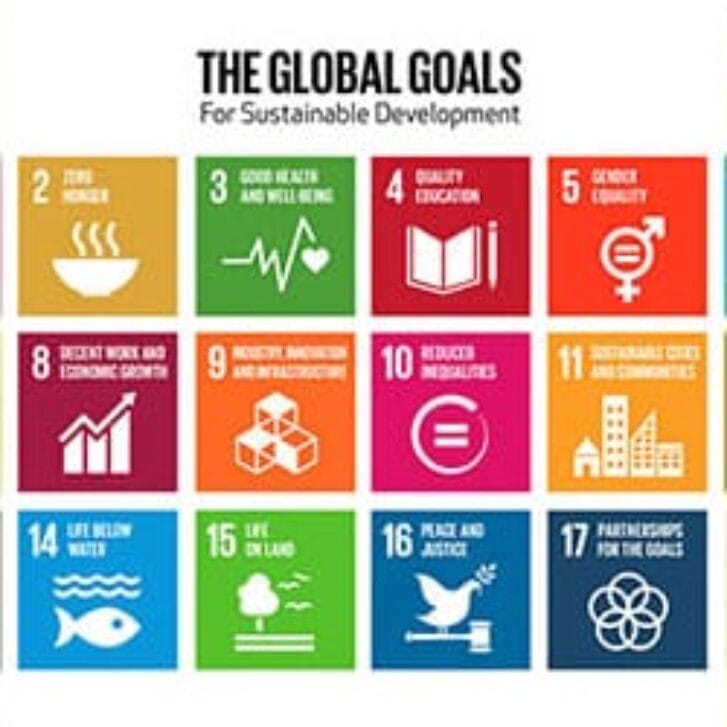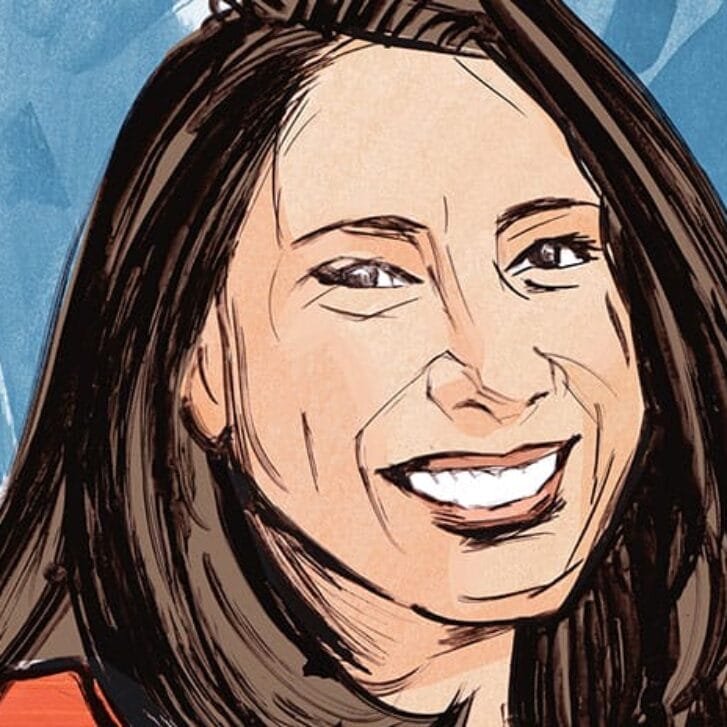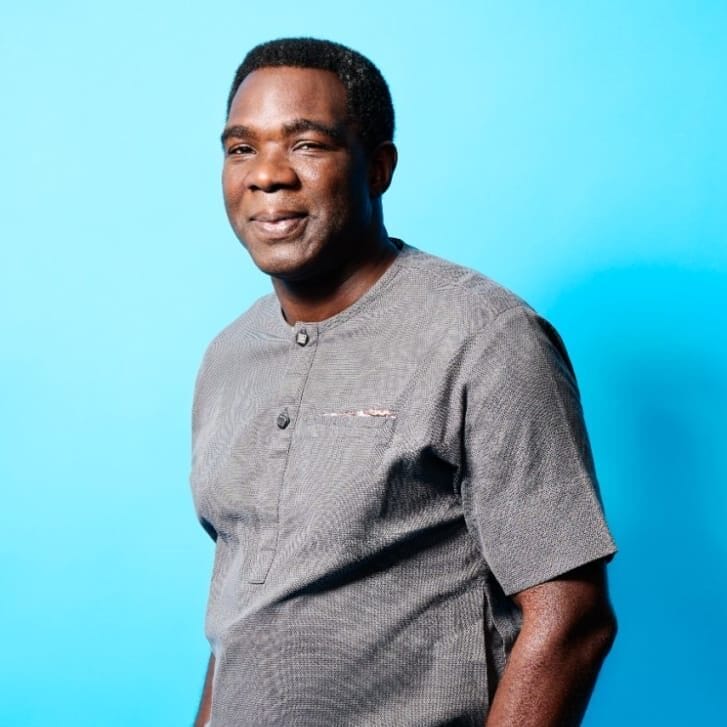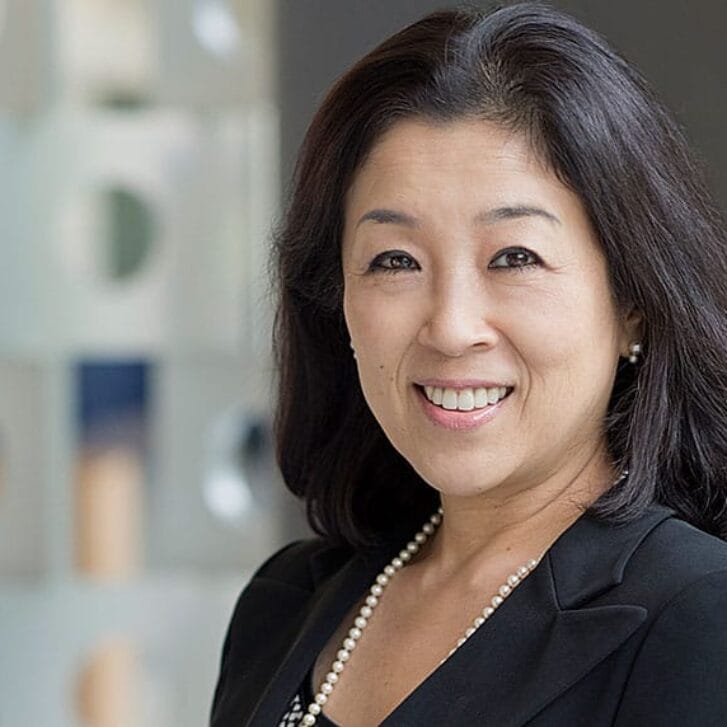The Wharton School and the World Bank have been partnering for years on initiatives regarding ethics in the private sector, as well as anti-corruption, climate change, and alleviating poverty and malnutrition. Last year, the collaboration reached far beyond academics in Philadelphia and development officials in Washington to include young people across the globe in the first-ever Ideas for Action (I4A) competition.
People between the ages of 18 to 35 submitted ideas for economic development projects that governments, in conjunction with private corporations, could finance and implement, as part of the United Nation’s Sustainable Development Goals (SDGs) for the next 15 years. The new goals are more ambitious than the U.N.’s current Millennium Development Goals, which expire at the end of 2015, and will cover a broader range of issues, from sustainable economic growth, to social issues, to global public goods.
Global leaders realize they need to come up with more practical and financially feasible ways to implement them—and it’s critical to include young people in that conversation.
“We hope this initiative will help young professionals change the conversation about development in their own companies and organizations, thus achieving distinct, lasting and substantial performance improvements,” says Mahmoud Mohieldin, the World Bank’s corporate secretary and the president’s special envoy.
Djordjija Petkoski, the former World Bank official who now serves as lecturer in the Legal Studies and Business Ethics Department and senior fellow at Wharton’s Lawrence Zicklin Center for Business Ethics Research and who helped develop the I4A, echoed that sentiment: “They [young adults] have to be those formulating the goals, so they will have a sense of ownership, so that it will be their goals and not the goals imposed by another generation,” Petkoski says.
It worked. Participants from 130 countries formed 330 teams to submit proposals to the inaugural Ideas for Action competition. The I4A winning teams and runners-up had practical approaches to their solutions, Mohieldin says, which included providing alternative workable scenarios or enhancing existing solutions through the utilization of new technologies. The six winners will get to present their ideas at the 2015 World Bank-International Monetary Fund Annual Meetings in Lima, Peru, in October, at which time global leaders will ring in the Sustainable Development Goals.
I4A proved to be a partnership in action. Wharton led the program, the World Bank provided the opportunity, and the youth brought creativity and optimism.
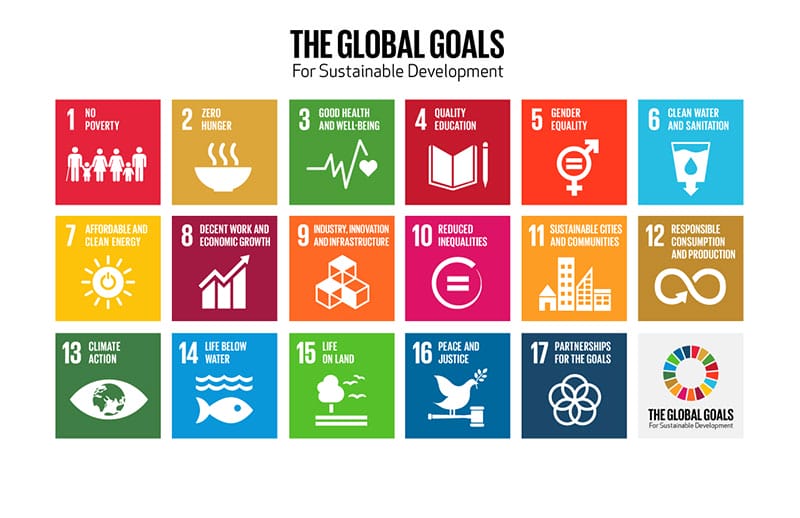
The 17 Sustainable Development Goals to end poverty, protect the planet and ensure prosperity for all.
The Actual I4A Ideas
Coming in first place out of three winners, Team Pennsurance proposed new microinsurance products for remittance service providers in India. Team members were then-Penn undergrad students Ezgi Aytac EE15 ENG15 W15, Arjun Bhaskar W15, Keshav Garud C15, Matthew McPhail EE15 and James Zhou W15.
“Remittances are large, growing and shock-resistant cash flows often employed by migrant workers to provide financial security to their families abroad,” Bhaskar says. “However, this method of support results in a heavy dependence on the remittance sender, and death, unemployment or injury to the worker can create stress on this cash flow and hence their families.”
To meet this problem, Team Pennsurance’s accident, disability and death (AD&D) insurance solution was based on the expansion of insurance penetration among low-income families who are heavily involved in remittance transactions, he says. This concept necessitates a partnership between a remittance service provider and a microfinance institution, with both players entering a premium-sharing agreement based on incremental costs.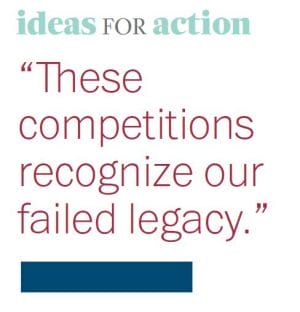
As an initial target market, the team selected the remittance sector in the United Arab Emirates, where a large segment of unbanked Indian migrants work in high-risk construction jobs, Bhaskar says. If the idea gains traction, the team recommends expansion to the Philippines, due to its established microinsurance market and financial technology sector, and ultimately, global growth.
The most challenging aspect of I4A was coming up with a solution that was “truly innovative as well as practical,” Bhaskar says. “We were a young team of 21-year-old undergraduate students without much hands-on experience, so achieving the optimal balance between these aspects proved to be difficult.”
Remittances proved to be an old financial product “ripe for innovation.”
I4A proved to be ripe for educational and personal development as well. Bhaskar recalls how he “immediately took interest” in the I4A competition because it integrated several pursuits: financial innovation, primary and secondary research, and international development. His interest only grew, a fact illustrated by a memory from one night during the team’s brainstorming.
“We ordered in pad thai using GrubHub and watched videos by [economics professor] Jeffrey Sachs on sustainable development, which fondly came to be known as ‘Jeffrey Sachs and pad thai night’,” he says. “That moment was amazing as it really showed that we were having a lot of fun and truly highlighted our team’s passion for economic development.”
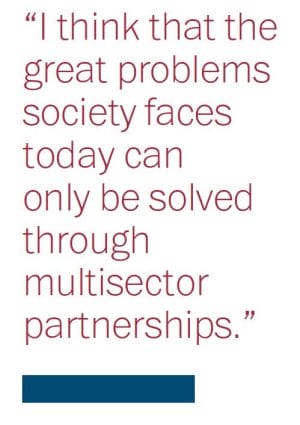
One of the three I4A runners-up, Team Backe & DeGagne, centered their research around a tailored development impact bond—a tool that could incentivize public-private, long-term investment in development projects, explains team members Lena Backe C15 and Matthew DeGagne W15.
The team’s model seeks to leverage existing public capital invested in the development space to secure additional private investment, the two say. Returns to private investors will be generated from savings to governments and nongovernmental organizations associated with achievement of specific social outcomes. Through a tiered-return approach, investors will receive payments according to the achievement of various impact milestones in the short, medium and long terms, ensuring investment commitment. The pay-for-success model draws a diversity of capital and stakeholders into the development space, Backe says.
“Building on pre-existing impact bond models and incorporating the focus areas of the Sustainable Development Goals, we presented our proposal as a case study applied to the funding of clean cookstoves in developing nations,” DeGagne says. “Combining finance, social impact and international development, our proposal truly embodies Penn and Wharton’s interdisciplinary focus.”
In the team’s case study, local individuals would be trained to market, distribute and repair the cook stoves.
“Our case example helps to scale access to clean, efficient energy sources for the billions of people without access across the world,” he says. “Clean cookstoves can also help lower the emission rates of ecologically and medically dangerous toxins created by open fires that that are linked with air pollution and numerous life-threatening medical conditions.”
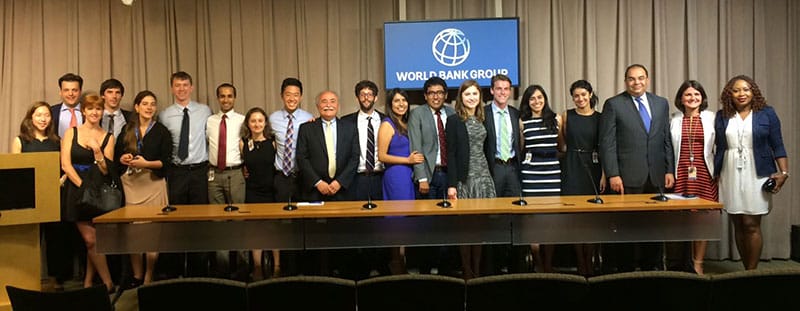
The Ideas for Action competition winners
A Model Partnership
Overall, the I4A participants’ submissions were deemed “very comprehensive, spot on,” says Nena Stoiljkovic, vice president of global client services at the World Bank’s International Finance Corp. who helped judge the I4A competition. Stoiljkovic is confident the participants’ proposals could be “adapted and integrated into the bank’s global practices approach.”
The I4A solutions proposed should be “a great interest to those private sector companies that look at young people as a source of new ideas that can be commercial or influence the business environment—and not just young people as a potential market or workforce,” Stoiljkovic adds.
The World Bank is exploring possibilities to include some of the proposals in operational work in specific countries, she explains. A few private investors are considering the funding of incubators to help some of the teams improve their proposals and get seed funding.
“It will be interesting to see which Ideas for Action attract potential partners in the months to come,” she says.
Another I4A judge, Luis Montoya, president of PepsiCo Latin America Beverages, was impressed by the proposals being very thorough and covering a wide range of opportunities, from improving productivity in the civil sector to impact bonds and even crowdfunding. I4A was a great example of partnerships in action, he says, with academia leading the program, development organizations providing the opportunity, the private sector with its expertise in implementation of solutions and especially the youth lending their creativity.
“It is very encouraging to see that this generation of young people is passionate about being part of the solution,” Montoya says. “It is through their creativity and ingenuity that we can get a new perspective to old problems.”
The issues at hand in the U.N.’s Sustainable Development Goals require more than just imagination and optimism however.
“I think that the great problems society faces today can only be solved through multisector partnerships in which the different actors understand the different roles that need to be played to overcome them,” Montoya says.
Watch the Pennsurance team explore and participate in the 2015 Annual Meetings of the World Bank/IMF in Lima in the video above:
Ideas for Action, Again
All of the I4A proposals have been published in a book disseminated at the 2015 World Bank-IMF Annual Meetings in Lima in October. The winners have also been invited to present their proposals at the event, hosted by the World Bank and Wharton, and select teams have also been asked to present their proposals at other events, such as the 2015 African Youth Forum at the sidelines of the African Development Bank Annual Meetings in Abidjan, Ivory Coast.
Wharton’s Petkoski has incorporated the winning I4A proposals in his teachings at Wharton for the fall semester, so students can be exposed to the ideas and debate the specifics of implementing the proposals. He is also planning on webcasting the classes to make them open to any interested young person around the world, as well as connecting with other business schools to use the same material, providing them teaching notes on how to use the material.
In addition to the already-underway second annual I4A competition, the Zicklin Center will soon announce the launch of I4A for students 14 to 18 years old, says William S. Laufer, the center’s director and the Julian Aresty Professor in the Department of Legal Studies and Business Ethics.
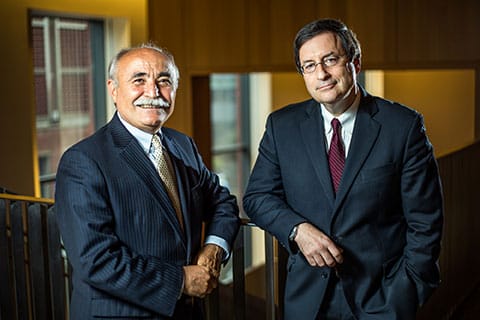
Djordjija Petkoski and William S. Laufer (Photo: Tommy Leonardi)
“These competitions recognize our failed legacy, from endemic poverty and corruption around the world, to the effects of the global warming of our planet, and genocides and politicides,” Laufer says. “At the same time, I4A looks to the inspiration, creativity, innovation, entrepreneurship and leadership of those who will soon inherit this legacy.”
Along with the success of Ideas for Action, the Zicklin Center is celebrating its 17th year overall of collaborating with the World Bank—a partnership that has included regular conferences, seminars and workshops on institutional integrity and anti-corruption strategy, to joint research projects in the United States and abroad, funded fellowships for Wharton students at World Bank headquarters and the World Bank Institute-Wharton Global Classroom Initiative.
The collaboration has also included the World Bank’s Mohieldin attending several Wharton classes, giving the corporate secretary the chance to discuss with students the importance of financing post-2015 development.
“I am impressed by students’ interest in development, the desire to learn about and engage with development organizations, including the World Bank, and their innovative thinking, particularly about the use of new technology and social media, in solving complex development challenges,” he says.
The collaboration between the World Bank and Wharton continues to grow—and is also sparking connections with additional colleges, Mohieldin says. “The cooperation with such a reputable school as Wharton has made it easier to engage with many similar academic institutions globally.”
Katie Kuehner-Hebert is a freelance journalist based in Running Springs, Calif. with more than 25 years of expertise.
[well]LEARN MORE ABOUT THE WINNING IDEAS FOR ACTION
The winners and runners-up for the inaugural I4A competition proposed the following ideas:
• Team Pennsurance: Remittance Microinsurance
• Team OXYGEN: Financing for Rice Farmers
• Team OUTCOME: Mining Royalty Funds
• Team Backe & DeGagne: Cookstoves Impact Bonds
• Team Impact.PH: Philippine Nonprofit Database
• Team Rolling Stones: Crowdfunding World Bank Operations
Read the abstracts from these six teams, as well as the 12 honorable mentions, online—as well as find more information about the 2016 I4A competition, at: http://www.zicklincenter.org/#!ideascompetition/ccl3.
[/well]



















